Mr Keese, what is your favourite coffee?
I am a fan of the Sacher Melange. Born in Germany, I came to Austria to eventually get to know and love Austrian coffee house culture, and what is very special about the Sacher Melange is the cappuccino with the whipped topping. I think that’s great.
When we look at Viennese coffee house culture – it is, after all, also a UNESCO intangible heritage – you get different opinions and views from people in each case. In your opinion, what is Viennese coffee house culture and what makes it so special?
What is exciting for Vienna and Austria is that the coffee house culture started very early here. I think the first coffee house in Vienna was founded in 1685 and Sacher also contributed to history in the end. I would like to reflect this influence with Sacher, because with the founding of the original Sacher Torte in 1832 and with the founding of the delicatessen in 1848 by Eduard Sacher, coffee and cake ultimately had a great tradition.
If you take history as a starting point, people used to have little money and tended to go to coffee houses because there was heating there and there was no money for it at home. This enjoyment coupled with conviviality has been cultivated in Austria and also in neighbouring countries such as Italy or Hungary, and has also found its way into southern Germany. For the Austrians, this means that people simply go out for a good coffee for no other reason.
Anna Sacher recognised this early on and especially in the 19th century, when ladies could not easily go to a coffee house, she opened a ladies’ salon, which is quite exciting from a forward-looking perspective. Summa Summarum deeply integrated and rooted, simply this sociable with a good quality of coffee paired with chocolate.
You have already mentioned that you are a native of Germany. Would you say that the Viennese coffee house culture is typical for Austria or for the former K&K area and in a certain way characterises the Austrian mentality, if there is such a thing, and lifestyle?
I think so, and in the end it is deeply rooted. Whether it’s a Viennese coffee house culture, whether it’s an Italian “quick at the counter for a euro to-go” culture or even this cosy newspaper reading. Especially now, after Corona, we are looking more and more for this quality, which is ultimately deeply rooted in the Austrians as well as in the neighbouring countries.
You mentioned before that I was born in Germany. I didn’t know the Austrian coffee house culture before. I knew ‘going for a coffee’, but not the specialities that exist in Austria, like the Fiaker or the Pharisee, there are such great stories behind them. For example, there is a story that the Fiaker came into being because the Fiaker used to freeze very much and had a crotch strap, so to speak, one with a cup in warm times and one without a cup in cold times so that it didn’t cool down too quickly, and the whipped cream on top so that it didn’t spill over when riding. I still think it’s great that this tradition is lived like this.
You have already mentioned that this cosiness is part of Viennese coffee house culture, that people either talk convivially or read the newspaper. In your opinion, has this cosiness been lost to a certain extent in a time of fast-paced life?
I would say yes and no, there are two different perspectives. If you look at Corona now, life was very fast-paced. A coffee, a piece of original Sacher cake and maybe a quick photo, and that was it. We have now had a little time to question what is there. I can only speak for myself, and what I’m noticing now is that people are simply looking forward to coffee and cake again and to taking the time to talk. We are now back to people taking more time, but I would say that before that it was already a certain culture for Austrians. Internationally, it doesn’t exist in this form, because the Italians or Japanese mentioned at the beginning live very quickly and don’t take so much time for coffee. I think it’s great that the coffee house culture is still so celebrated in Austria.
I lived in Hanover for a long time and tea culture was popular there. A lot of tea drinkers who also enjoy themselves there a bit, but really sit together and read the newspaper, that’s something I really only know from Austria.
Could you outline the development of coffee house culture and in particular of Café Sachers over the last 100 years? What have been the main developments?
We had the opening of the Hotel Sacher in 1876 with the original Sacher Torte, an essential cornerstone of this house. And the coffee house has always played an important role for us. In 1900, for example, ladies were not allowed to go into a coffee house, so Anna Sacher set up a ladies’ salon to circumvent this law.
If you look now, tradition and quality have always played an important role. Very different types of coffee have developed over the years. And I find it very exciting to live on with this heritage and these products. A Fiaker or a Pharisee is still on the menu and we try to live on this tradition with the development.
We have very well trained baristas, we have – you can see this cappuccino with a heart shape or with an elephant – because people are enthusiastic about it. We have gained more and more in terms of quality, also in the finalisation. We have had times when up to 1,500 guests have visited us in the coffee house, with the performance and demand for the highest quality, which is a matter of the heart for Sacher. However, this also requires the right employees who are burning for it. And Sacher has simply managed to maintain this quality over a very long distance. Here too (note at the table) the finest porcelain with gold embossing and you can see this appreciation.
The Viennese coffee house Sacher is a traditional institution and also a flagship, not only of Vienna but also of Austria. How do you manage to maintain this tradition while at the same time keeping up with the times? For example, a few decades ago there was no cappuccino in a Viennese coffee house and that was also a revolution in a certain way. How do you manage to find a balance here?
It has always been important for Sacher not to rest on the success of the last 150 years, but to keep moving forward. Cappuccino was unthinkable decades ago, coffee to go was unthinkable ten years ago, but we did it because the feedback from the market and the wishes of the guests were in line with this. It is incredibly important for us to have a relationship with our guests in order to take their opinions into account and, in a next step, to address the topic of digitalisation, for example. On the one hand, we talk about Viennese coffee house culture; on the other hand, we try to keep our finger on the pulse of the times through digitalisation – you can see the example of a menu with a QR code at the table, where the guest has the option of viewing the menu on his or her mobile phone or accessing background information about the original Sacher cake and how the coffee is made.
We have highly developed coffee machines that can be varied to the gram, the degree of grinding, the temperature to 0.1 point, in order to be able to offer the best coffee here. The coffee machine in the back office of the coffee house, for example, has a different temperature than the coffee machine in the café garden, where it is very windy. You have to set the machine hotter so that the coffee has the same temperature as in the coffee house. And these small details make up the service experience and that’s why it’s very important to always be at the forefront and to always question oneself. That’s why we also try to find enthusiastic employees who enjoy making up to 1,500 cappuccinos a day. I tried it once with the hearts and elephants and now I know that it takes colleagues who really want to do it, and ultimately also the guests who ask for it.
Even a chai latte would have been unthinkable three years ago. Today it’s on the menu because the customers simply want it. It would be fatal to dictate to the guests what we want; what counts in the end is what the guest wants.
In this context, what influence has the establishment of modern coffee shop chains such as Starbucks had on the traditional houses?
That is a double-edged sword. On the one hand, we are happy to have competitors. Starbucks has very good coffees and has created something with their system gastronomy where we can also learn something from it. I believe that in the end it is a win-win for everyone because the interest becomes much greater. We are also happy, for example, when a new five-star hotel opens in Vienna. With each other instead of against each other, because everyone benefits from each other.
Starbucks appeals to other people, but if the guest says: “I don’t like the coffee, I’ll try it at Sacher now” and vice versa, we also benefit from it. On the one hand, I’m happy that globalisation is taking place in terms of quality, and on the other hand, we also stand for being something very special. You can’t go to Sacher everywhere and that’s what makes us unique.
When you ask tourists about Austria, one of the first associations is sometimes Sacher. Hallstatt, Prater and Sacher.
And St. Stephen’s Cathedral.
And St. Stephen’s Cathedral. Of course. In other words, one of the most important figureheads. Do you feel a special responsibility as Hotel and Café Sacher in this sense, because you also act as a figurehead, whether intentionally or unintentionally, and how do you deal with this responsibility?
Working at the Sacher is ultimately a privilege. As the hotel director, it fills me with pride to be able to keep the hotel’s history alive or to help write it. Every employee who works here feels connected to the hotel and its tradition, and we always try to be state-of-the-art. As a family-run company, we want to act as one big family with our employees. It is family, tradition and passion. You can also see this in the unique premises of the Sacher, which make it very special.
There are countless films, novels and also many brochures about the Café Hotel Sacher. If you look at the entire coffee house landscape, there are also other well-known establishments such as Café Central, Schwarzenberg, and so on. Sacher, however, is in an even more special role, also with tourists, not only with the locals. What do you think is the reason for this?
Café Sacher is unique because we have had this ‘extra sugar’, this unique cake, since the original Sacher Torte was founded, in 1832 by Franz Sacher. No other house, no other hotel in the world actually has a cake that has such an international presence. As I said before, St. Stephen’s Cathedral is Austria, then the original Sacher Torte. There were several reports earlier this year that the Sacher Torte is the most popular pastry on Instagram.
And people come here to eat the original Sacher Torte. Because you can get a Sacher Torte at Café Central, at Café Hawelka and probably also at Café Aida, but the original, you can only get it here. And that’s why it’s simply important for everyone to sit in Café Sacher Wien and eat the original Sacher Torte.
You could say it’s similar to the original Mozartkugel at Café Fürst in Salzburg.
Absolutely. And this Mozartkugel has been made countless times, but the original is only available from or at Café Fürst. And besides the Mozartkugel, they also make a wonderful ice cream, namely the best Morellene ice cream I’ve ever had. When I’m in Salzburg, I go to Café Fürst to buy the Fürst Mozartkugel, because it’s the tradition on the one hand and the quality on the other. And to maintain this quality internationally or nationally over this long period of time is unique, and of course as many people as possible try to do that, and that’s why this “sitting in Café Sacher, enjoying the original Sacher Torte” is just so strong. In the end, that’s what makes us unique.
While we’re on the subject of the Sacher Torte. How did the original Sacher Torte come about and what made it so popular in Austria? And above all, so popular to this day.
It all began in 1832 with Franz Sacher. An apprentice who at that time had to create a dessert by chance because the cake chef was ill. And a big dinner had been prepared with a big banquet, the chef fell ill and little Franz was supposed to create something very special. At the age of 16, he baked a cake that went down in history, the original Sacher cake. Franz Sacher, it must be said, was a clever cook who quickly realised that the Original Sacher Torte was something very special. His son, Eduard Sacher, who had a delicatessen not far from the Hotel Sacher Vienna, sold the Original Sacher-Torte in his shop and it became more and more famous.
With the construction of the hotel in 1876, here opposite the State Opera, the cake continued to be at the centre of the Sacher empire and then naturally grew with it. But it all started with an apprentice who had to bake a cake by chance, and that was the original Sacher Torte.
Now we have a manufactory. Until the year 2000, production was in the cellar of this house. It is even rumoured that the first district used to smell of chocolate. With the higher number of pieces in production, we then moved to the 11th district of Vienna to have our own manufactory in Vienna. We now produce about 300 thousand cakes a year. And for those who want it a little smaller, we produce the original Sacher cube, which I like very much myself. We also produce a million of these by hand. The recipe hasn’t changed since 1832 and it’s also the best-kept secret in Sacher history.

In July 2021, the Sacher Pop-Up World will open in the Sacher Eck on Kärntnerstraße. The exhibition offers an exclusive look at Sacher’s long coffee house history with a unique collection of historic coffee grinders, coffee services and other Sacher relics.
You have already mentioned it a few times in passing. Hotel Sacher is also known for preparing and holding events. Is there a certain routine or how does Hotel Sacher prepare for this?
You can’t say routine, because every guest has different wishes and plans different events. It becomes more and more individual every year and the guests’ wishes also become more and more special and of course we always try to satisfy the guest as much as possible. The annual Opera Ball is also not the same every year and we always try to have the Opera Ball with different mottos and themes.
We sometimes face challenges because this is a very old house. The kitchen is in the basement. That means a lot of stairs. And of course we have lifts. We need a large number of staff to cover the volume, especially for events. But we also have a lot of fun because every room, every event is unique. When you come to the Hotel Sacher, you see the different buildings. Different window sizes on the right and on the left, because the hotel has naturally grown over the years and we also have some exciting challenges with staircases for room service or housekeeping.
Every event is different for us because, of course, the guests’ wishes have top priority. That’s why every event is always different and we try to work with flexibility or synergies to enchant our guests.
During your time as hotel director, are there any personalities you particularly remember?
Many. I’ve been working for Sacher for four years now and it was very international, especially for the Opera Ball and generally before Corona. The Opera Ball requires weeks and months of planning. We have up to 500 people who have to be fed within one and a half hours with an 8-course menu and an aperitif. The hotel bar is rearranged. Tables are being prepared. Every centimetre is used. And then there was the arrival of a film star who is also a regular guest with us and who, as always, wants to sit at his regular place, his table in the red bar. We then had to rearrange tables at the last minute so that there was room for a table of two in the middle of the room. We managed that in the end too and no one noticed anything. This again shows our flexibility and spontaneity.
There are now four Café Sacher locations. Are there plans to open more locations in Austria? Maybe even abroad?
We even have five. We have Café Sacher Graz, Café Sacher Innsbruck, Café Sacher Salzburg, the coffee house in Vienna and in Parndorf there is also a coffee house that we opened two years ago. We have also tried it internationally with two pop-up cafés in the last two years. In 2019, a Sacher Café in Geneva Beau-Rivage and last year in Schloss Bensberg in the Cologne area and again in Geneva because it was so successful the previous year. It was very well received internationally and we are continuing to work in this direction because we simply have a lot of original Sacher cakes and Café Sacher fans internationally.
Would you say that overtourism has devalued the coffee house culture a bit or how does the phenomenon affect you?
I wouldn’t say devalued, because the demand is simply great. When you see on social media how nice it is to sit in a coffee house, everyone ultimately wants to fulfil this dream and it is of course a pleasure for us to welcome many guests, especially from international countries, to the Hotel Sacher, because with Sacher we simply want to fulfil dreams.
What of course smacks a little of the fact that people have sometimes, perhaps unintentionally, forgotten to enjoy. A city trip that used to be a one or two week holiday is now “worked off” in 48 hours. You go to four coffee houses, then you go out to eat a few times and then you fly back again to see everything as best as possible.
But I think just now, when you want to enjoy again – want to have this time – “enjoyment” has come back a little bit and I hope it has come back to stay.
Do guests still enjoy a classic coffee with cake and a daily newspaper, or has it already become too much of a tourist attraction? Keyword: experiencing more in less time?
You have just sat opposite a gentleman with a newspaper. We are happy to have such guests. In the end, it’s up to the guest himself how he wants to enjoy his coffee. I’m super happy when I stand at a counter in Italy and drink an espresso and after five minutes I’m on my way again. But I’m also happy to enjoy a cappuccino or a Sacher Mélange. In the end, everyone enjoys differently. For us, it’s important that guests walk out with their requirements met enthusiastically. Depending on what they are looking for. We try to satisfy every need. If we now have a guest who drinks a coffee and reads a newspaper in an hour or have an international guest who absolutely wants to try an original Sacher Torte with a Sacher Mélange and then has to leave again, then we try to inspire both characters as best we can.
We have now been through more than a year where pretty much no stone has been left unturned. Corona has shaken things up a lot and I suspect their business model as well. How did Sacher manage through the crisis?
Right at the beginning of the pandemic, we tried to look optimistically into the future. We tried to overcome this crisis with all our staff and started with various projects for “after the pandemic”. The house in Vienna was well attended in the times before. Now we really had the time to think about what we can change. For example, we opened a drive-in for the Original Sacher Torte in Pandemic, which you may have already seen today, where customers can pick up the Original Sacher Torte securely and without contact. We deliver the Original Sacher Torte home with a bellhop to bring the need for a Sacher experience home as well.
We used the time to question work processes. Together with the employees, we developed a Sacher app to promote digitalisation. Many exciting ideas… We used the time very effectively and it makes us very proud that we involved every single employee.
Do you expect certain assistance from politics?
I think that politics has already provided a lot of support. With the short-time work model, the support for ancillary costs… Austria was one of the leading countries worldwide that supported the hotel and restaurant industry. We have to say thank you that this is possible.
Some will say: “It’s too little”. Another will say, “It’s too much.” But I believe it is a good balance. At the end of the day, we can be grateful that this aid package existed.
We are now in an opening phase, also here, we are now sitting in a coffee house, we can enjoy coffee again. Where do you see the upcoming challenges now for both the coffee house and the hotel?
Hotel Sacher Wien, like international city tourism, is built on and dependent on international clientele. In contrast to rural tourism, we are positioned quite differently. We live off the international audience. It will still take years if you listen to what the airlines are saying. By 2023, 2024, we will be at the 2019 level, so there is still a long way to go. We are very optimistic and very happy to welcome guests from Austria, Austrians, and also the neighbouring countries who want to come to us, and the trend is increasing, which makes us very happy. But it will still take years until we get there. But we are very happy that the staff and guests are in the house. It’s just part of the experience.
Where do you see coffee house culture in the future, or where do you want coffee house culture to develop?
I would like us to continue working on the quality and the product. The original Sacher Torte will hopefully be produced according to the same recipe in the future as it is now, because it tastes simply wonderful. I think it’s important to just enjoy this cultural asset, this privilege that you ultimately have. Of course, nobody knows what it will look like in the future, but the cappuccino tastes quite good and I can imagine still drinking it like that in 50 years.
We would like to thank hotel director Andreas Keese for the interview.



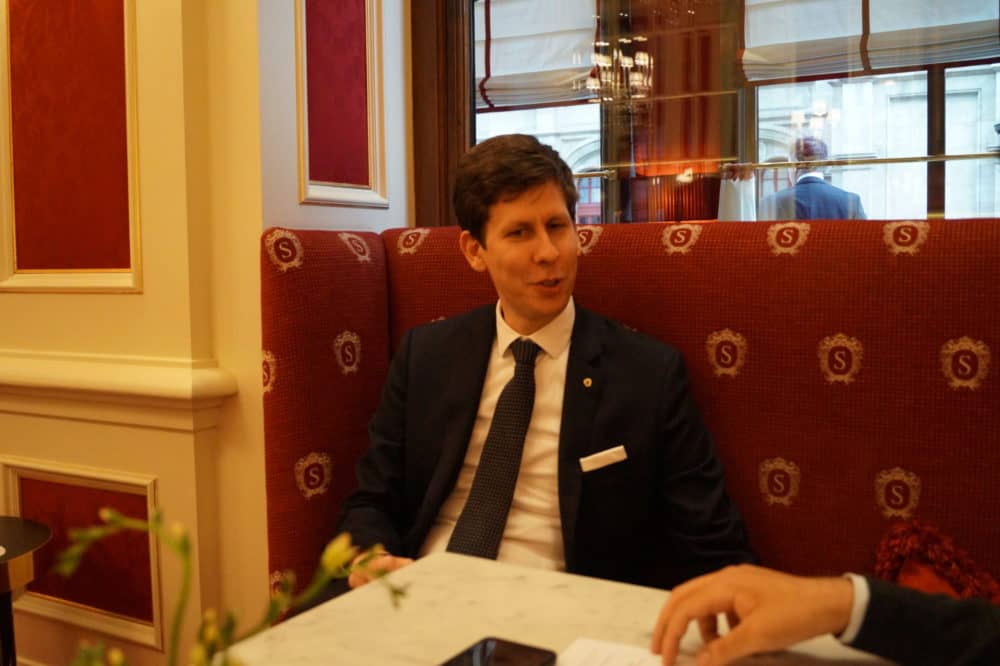
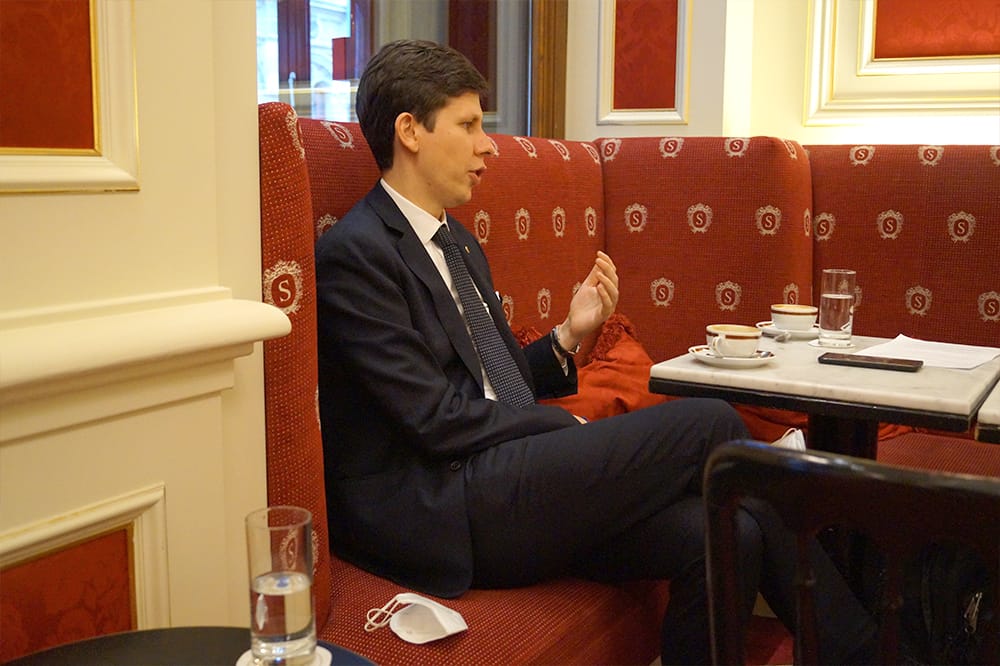
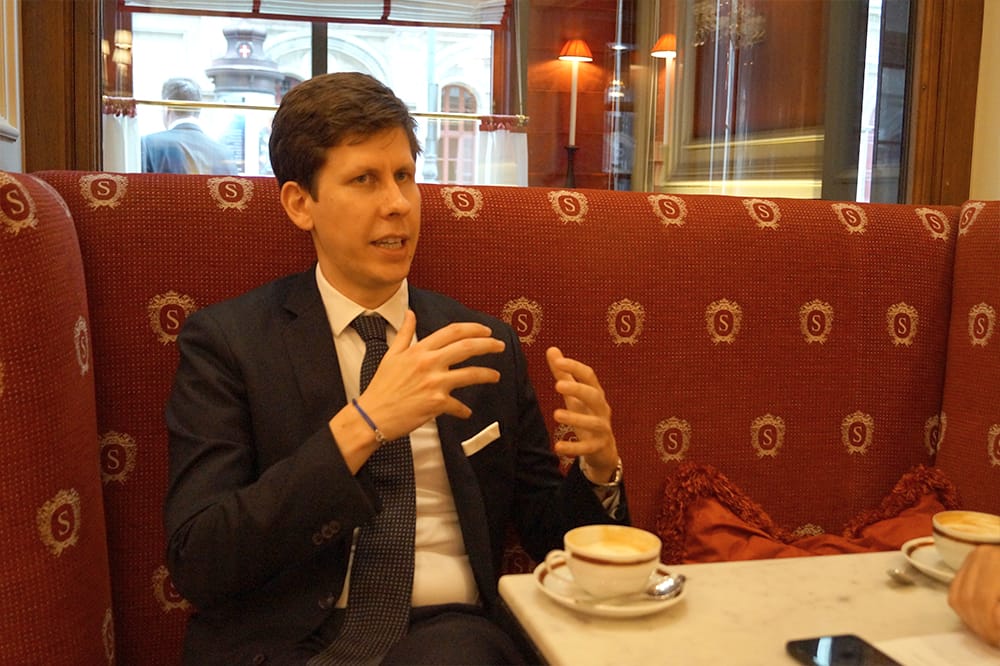
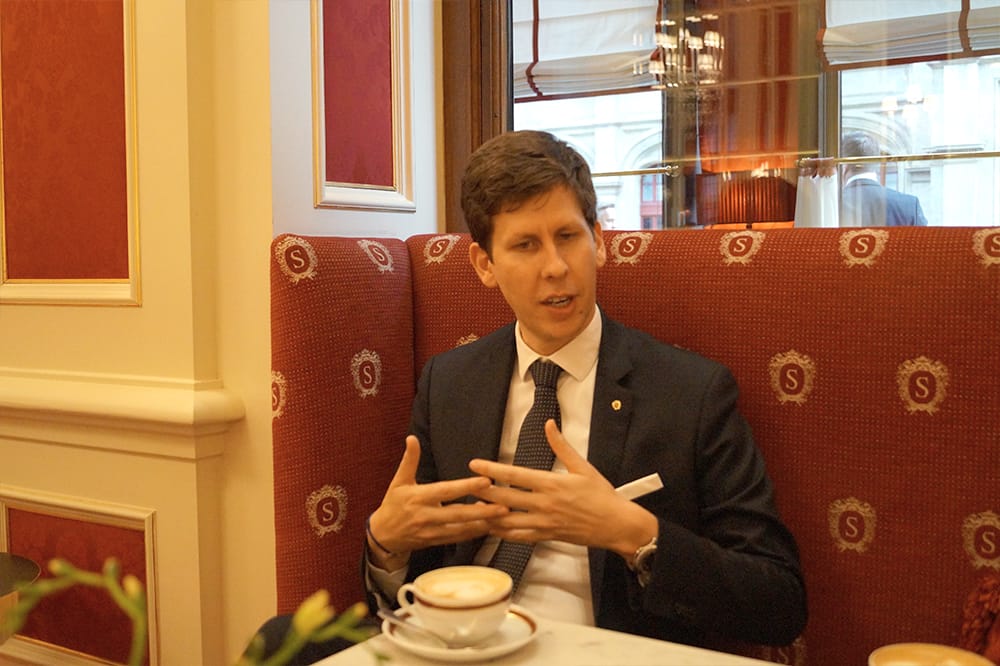
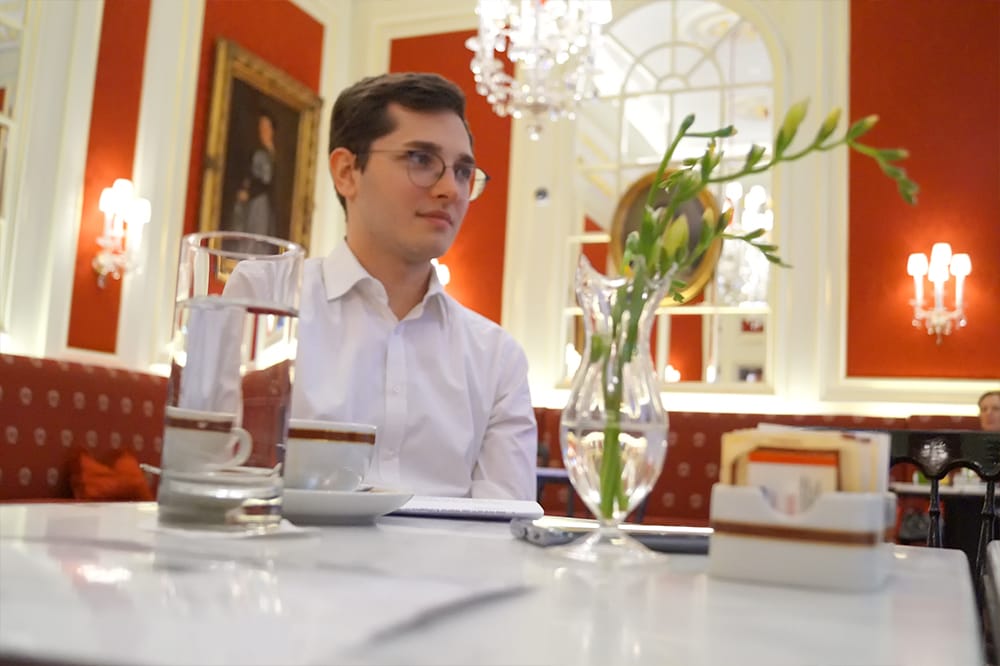
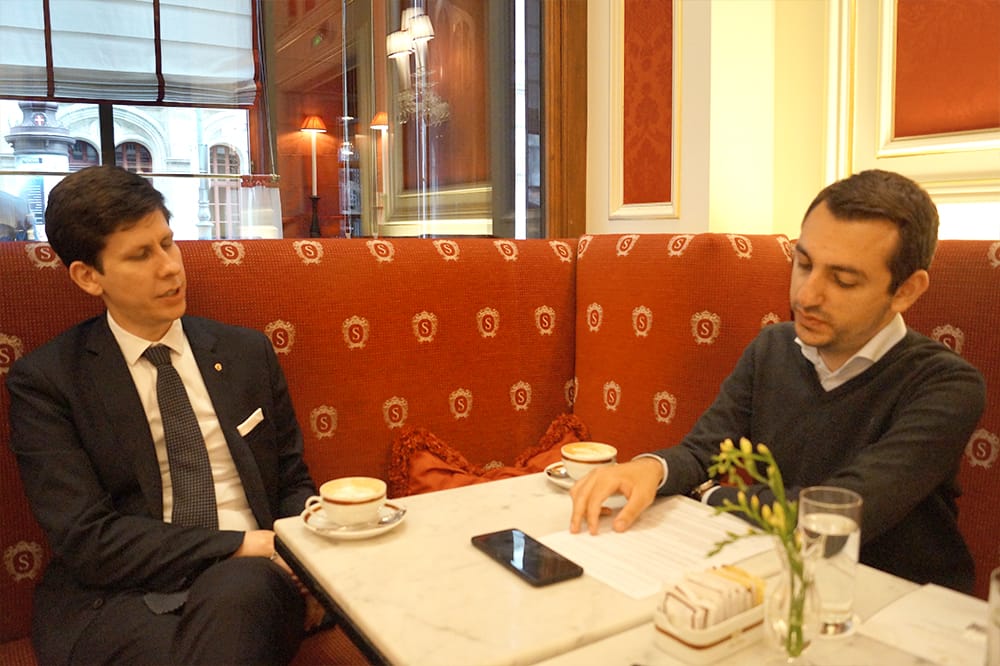










Kommentare